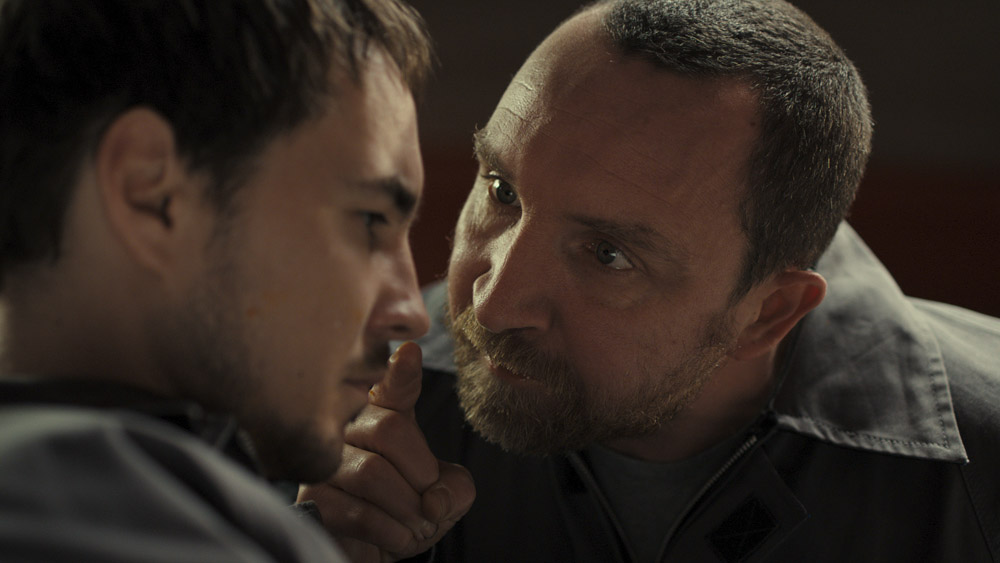Today’s guest post is from writer/director J. Blakeson. J’s THE DISAPPEARANCE OF ALICE CREED opens TODAY!!! If you haven’t read yesterday’s part one, please read that first.
As I was writing I was always looking for tricks to make the film even cheaper to shoot. But I had a strict rule that they also had to make absolute sense to the story. I smuggled quite a lot of tricks in. Here are a few of them…
- After the opening sequence, each character only has one costume. And they are very easily manageable costumes (ie. track suit and boiler suits), so if we had to shoot this thing at evenings and weekends over a few months, then the costumes would be easy to manage and very replaceable from high street stores.
- I used props over and over again (the gun, the keys, the bullet) to maximise their cost-effectiveness and reduce the need for more props.
- I made the location an abandoned apartment so we didn’t have to fill it with furniture.
- I had the characters cover the windows of the apartment with wood to hide what they are doing from the outside world – but also because it meant I could shoot daytime scenes at night and vice versa (a nifty trick lifted from Kevin Smith’s “Clerks”).
- I put ski-masks on Vic and Danny and a hood over Alice for a lot of the action. Of course this works because Vic and Danny want to hide their identity and keep Alice passive, but it also meant that if we got any “name” actors for 2-3 days, we could shoot all their scenes on their faces in that time and shoot the rest (wides, over-shoulder, out of focus in the background etc) using stand-ins wearing hoods and balaclavas…
 However, I never actually needed to use these tricks whilst filming – thank god. There are no stand-ins for actors and we shot on a sound-stage rather than in my apartment. And this happened because I got lucky. Cinema NX read my script and loved it. They decided to take a gamble on me and agreed to let me – a first-time director – helm the film (I was once told by a producer that a first-time director “is like cancer to financiers”). I’ll always be grateful to Cinema NX for giving me my break (especially as 40 other companies read the script and passed). So Cinema NX put up all the money to make the film. And I got myself an actual budget. Sure, it was low, but it was way more than I could have ever afforded on my own. So luckily I didn’t have to make the film the way I’d originally intended. I didn’t have to put my hand in my own pocket. And I got to build a set. I got an amazing crew. I got fantastic actors. I got to shoot my film exactly the way I wanted without compromising for budget.
However, I never actually needed to use these tricks whilst filming – thank god. There are no stand-ins for actors and we shot on a sound-stage rather than in my apartment. And this happened because I got lucky. Cinema NX read my script and loved it. They decided to take a gamble on me and agreed to let me – a first-time director – helm the film (I was once told by a producer that a first-time director “is like cancer to financiers”). I’ll always be grateful to Cinema NX for giving me my break (especially as 40 other companies read the script and passed). So Cinema NX put up all the money to make the film. And I got myself an actual budget. Sure, it was low, but it was way more than I could have ever afforded on my own. So luckily I didn’t have to make the film the way I’d originally intended. I didn’t have to put my hand in my own pocket. And I got to build a set. I got an amazing crew. I got fantastic actors. I got to shoot my film exactly the way I wanted without compromising for budget.
So was all my penny-pinching on the page a waste of time?
No.
Because the reason it all happened the way it did is precisely because it was written for no budget. Not only because Cinema NX saw it was achievable, and a worthwhile gamble, but because writing it for no budget meant that we could make a really good version with a low budget. As the limitations had been set on the page, we didn’t have to compromise while we were shooting it. We just had to concentrate on making it the best it could be.
In short, by embracing my budget limitations in the writing stage, I protected myself during the shoot. Plus I had to use my imagination more as I wrote it. And that can only be a good thing.
— J. Blakeson
“The Disappearance of Alice Creed” is out in selected theatres Friday August 6th www.thedisappearanceofalicecreed.com
Twitter: twitter.com/jblakeson
twitter.com/FindAliceCreed
The Disappearance Of Alice Creed trailer
Part One: Writing For A Low Budget





